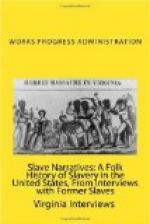“I seed de patyrollers every week. If de niggers didn’ get a pass in han’ right frum one plan’ation to ’nother, dem patyrollers would git you. Dey would be six an’ twelve in a drove, an’ day would git you if you didn’ have dat piece of paper. No sun could go down on a pass. Dere was no trouble twixt niggers den.
“We lay down an’ res’ at night in de week time. Niggers in slav’ry time riz up in de Quarters, you could hear ’em for miles. Den da cornshucking tuk place. Den we would have singin’. When one foun’ a red ear of corn, dey would take a drink of whiskey frum de jug an’ cup. We’d get through’ bout ten o’clock. De men did’n care if dey worked all night, fer we had the ’Heav’nly Banners’[FN: women and whiskey] by us[HW:?].
“Sometimes we worked on Sat’day a’ternoon, owin’ to de crops; but women all knocked off on Sat’day a’ternoon. On Sat’day night, we mos’ly had fun, playin’ an drinking whiskey an’ beer—no time to fool ‘roun’ in de week time.
“Some went to chu’ch an’ some went fishin’ on Sunday. On Chris’mas we had a time—all kinds eatin’—wimmen got new dresses—men tobacco—had stuff to las’ ’til Summer. Niggers had good times in mos’ ways in slav’ry time. July 4th, we would wash up an’ have a good time. We hallowed dat day wid de white folks. Dere was a barbecue; big table set down in bottoms. Dere was niggers strollin’ ‘roun’ like ants. We was havin’ a time now. White folks too. When a slave died, dere was a to-do over dat, hollerin’ an’ singin’. More fuss dan a little—’Well, sich a one has passed out an we gwine to de grave to ’tend de fun’ral; we will talk about Sister Sallie.’ De niggers would be jumpin’ as high as a cow er mule.
“A song we used to sing was” [HW: Sang]
‘Come on Chariot an’ Take
Her Home, Take Her Home,
Here Come Chariot, les’ ride,
Come on les’ ride, Come on les’
ride.’
“Yessum we believed ha’nts would be at de grave yard. I didn’ pay no’ tention to dem tho’, for I know de evil spirit is dere. Iffen you don’t believe it, let one of ’em slap you. I ain’t seed one, but I’se heard ‘em. I seed someone, dey said was a ghos’, but it got ’way quick.
“When we got sick de doctor come at once, and Mistiss was right dere to see we was cared fer. A doctor lived on our place. If you grunt he was right dere. We had castor oil an’ pills an’ turpentine an’ quinine when needful, an’ herbs was used. I can fin’ dat stuff now what we used when I was a boy.
[HW: Superstition]
“Some of us wore brass rings on our fingers to keep off croup. Really good—good now. See mine?
“Yessum I knows all ’bout when Yankees come. Dey got us out’er de swamp. I was layin’ down by a white oak tree ‘sleep, an’ when I woke up an’ looked up an’ saw nothin’ but blue, blue, I said, ’Yonder is my Boss’s fine male hoss, Alfred. He ‘tended dat horse hisself.’ He took it to heart, an’ he didn’ live long afte’ de Blue Coats took Alfred.




